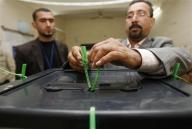 BAGHDAD – Iraqis held their most peaceful election since the fall of Saddam Hussein on Saturday, voting for provincial councils without a single major attack in a poll that demonstrated the country’s dramatic security gains.
BAGHDAD – Iraqis held their most peaceful election since the fall of Saddam Hussein on Saturday, voting for provincial councils without a single major attack in a poll that demonstrated the country’s dramatic security gains.
U.S. President Barack Obama hailed the poll as an important step toward Iraqis taking responsibility for their future. “I congratulate the people of Iraq on holding significant provincial elections today,” he said in a statement.
“The purple fingers have returned to build Iraq,” Prime Minister Nuri al-Maliki said after the polls closed, referring to the indelible ink stains on index fingers that show voters have cast their ballots.
There was something of a holiday atmosphere in many parts of the country. In normally traffic-choked Baghdad, children took advantage of a ban on cars to play soccer in the streets.
“How can we not vote? All of us here have always complained about being oppressed and not having a leader who represented us. Now is our chance,” said Basra voter Abdul Hussein Nuri.
The last election in 2005 took place amid a raging Sunni insurgency and was followed by a surge in sectarian slaughter between once dominant Sunni Arabs and majority Shi’ite Muslims.
That violence has dropped dramatically since 2007. Iraqi figures released on election day showed 138 civilians killed in January, the least deadly month since the invasion. Four U.S. soldiers were killed during the month, also a record low.
Maliki, who claims credit for improving security, aims to use the election to build a power base in the provinces before national polls later this year. Sunni Arab groups who boycotted the last provincial polls hope to win a share of local power.
In the few reported violent incidents countrywide, mortar rounds landed in Saddam’s home town of Tikrit but no one was hurt, and Iraqi troops shot one person dead and wounded another after a quarrel in Baghdad’s Sadr City slum.
U.S. forces said they killed two men who turned out to be police officers during a raid in Mosul overnight.
Defense Ministry spokesman Major General Mohammed al-Askary said there were no major breaches in a massive security plan.”
“I consider it a great success, like a wedding.”
The 140,000 U.S. troops in Iraq had patrols on the streets and helicopters in the sky but mostly kept a low profile. A U.S. armored column was seen weaving down a Baghdad street between children and rocks placed in the road as makeshift soccer goals.
Five candidates were assassinated in the run-up to the election — three just two days before the vote. But University of London Iraq expert Toby Dodge said the democratic process itself had escaped attack.
“Those who want to pull down the electoral process as a whole have just not been able to get off the ground.”
GLITCHES
Still, there were glitches. Thousands of people failed to find their names on voter registration lists and could not vote. One of them was elderly Fadhel al-Shimary, who had walked three km (two miles) to vote in Baghdad’s Palestine Street, stopping every 50 meters to rest in a chair carried by his son.
“I will wait here until the night. I must vote before I die,” he said. “Maybe they are trying to steal my vote. But I will not allow it. I am still alive. I am not dead yet.”
In Khanaqin, a mainly Kurdish town in ethnically-mixed Diyala province, hundreds of angry Kurds took to the streets to protest after being told they were not on the list.
Election officials began sorting ballots, but early results will not be available for days and a final tally not for months.
“So far, so good. The significance? Historic,” U.N. Special Representative Staffan de Mistura told Reuters at a polling station in a Baghdad school.
Just under 15 million of Iraq’s 28 million people were registered to vote for provincial councils that select powerful regional governors in 14 out of Iraq’s 18 provinces.
Three Kurdish provinces will vote separately, and the election was indefinitely postponed in the divided northern city of Kirkuk, a potential flashpoint, to avoid a showdown between Kurds and Arabs vying for control there.
The election should cost the Kurds control of Mosul, Iraq’s most violent city, where majority Arabs boycotted the last vote.
Maliki, once seen as a weak leader installed by more powerful Shi’ite parties, has seen his stature rise over the past year after a crackdown on militias. He has toured the country in recent weeks campaigning with a law-and-order theme, and there were signs he had won support in once hostile areas.
 Eurasia Press & News
Eurasia Press & News